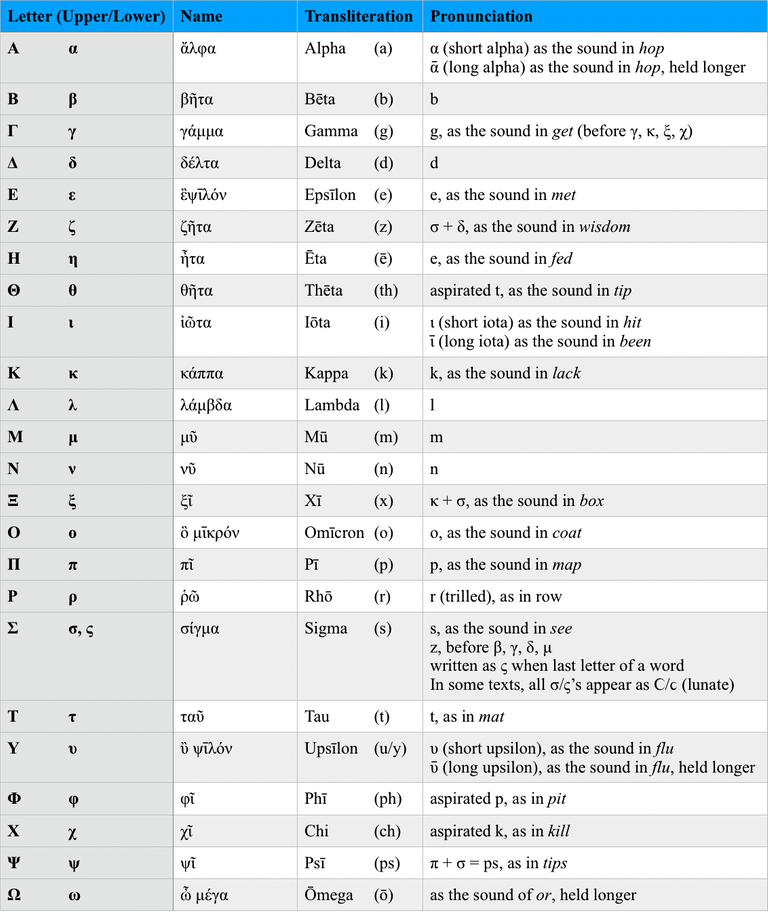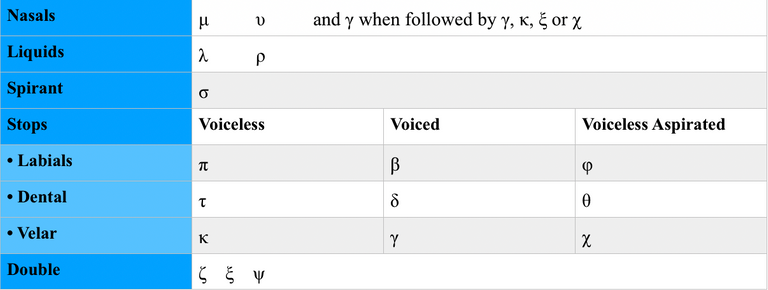NOTE: This blog is for understanding VERY BASIC Ancient Greek and will not delve deep into teaching you how to write/speak it at an advanced level; it's for being able to understand letters and simple pronunciations, and to be able to, with that, recognise and understand some basic words.
Before diving into any chronological Greek history, I thought it would be best to first let you get at least a basic grasp of reading and understanding Ancient Greek language, as my future blogs may contain images of ancient inscriptions or writings, or names of people/places written in Greek, that would, with this first blog, be easier for you to understand.
As the Ancient Greek alphabet is, in part at least, the parental language for other languages like Latin, Gothic and Armenian, which in turn are the parental languages for many of the languages spoken around the world today, much of the Greek alphabet will be recognisable to you already:

ACCENTS and SYMBOLS
˘ (breve) Used over vowels to show a vowel of short quantity (the symbol is usually not shown)
(The vowels 'ε' and 'ο' are always short)
ˉ (modifier) Used over vowels to show a vowel of long quantity (long vowels are held roughly twice as long)
(The vowels 'η' and 'ω' are always long, so are not held with macrons)
̃(circumflex) Vowels marked with this are always long, and don't usually have macrons)
BREATHINGS
h is not in the Attic alphabet, but the sound is spoken at the start of some Greek words, indicated by a ‘rough breathing’ or ‘aspiration’, written atop the first vowel in a word, or over the second vowel of a diphthong:
• ἑν (pronounced "hen")
• οὑ (pronounced "hou")
Whenever the h sound is NOT to be pronounced at the start of a word starting with either a vowel or diphthong, a smooth breathing mark is instead utilised:
• ἐν (pronounced "en")
• οὐ (pronounced "ou")
Every word, therefore, starting with a vowel or diphthong will have a rough or smooth breathing. An initial 'ρ' will always have a rough breathing:
• ῥάβδος (meaning "wand")
DIPHTHONGS
A diphthong is the glide from one vowel sound to the next in the same syllable.
Attic Greek has the following diphthongs:

DIGRAPHS
Digraphs are letter combinations which make up one sound. The two vowel sounds are represented in Greek by these digraphs:

IOTA SUBSCRIPT
An Iota Subscript is when iōta (ι) is written under a vowel, such as 'ᾳ', 'ῃ' and 'ῳ'. These combos are also known as diphthongs.
In earlier Greek language, this iota was written on the line straight after the vowel instead of under it, being pronounced instead as a short iota. Its pronunciation stopped as Greek evolved, and it’s usually not pronounced anymore. Whenever it is present in a completely capitalised word, it’s written on the line as a capital iota:
• πρὸς τῇ κρήνῃ > ΠΡΟΣ ΤΗΙ ΚΡΗΝΗΙ
(Take note that accents do not get used when all letters are capitalised in a word).
• πρὸς τηι κρήνηι
PAIRED CONSONANTS
Paired consonants like 'λλ', 'μμ', 'ππ' and 'ττ' are to be pronounced double, and held for about twice the length when pronouncing:
• the 'μμ' in the word "γάμμα"
Exceptions to this rule are the double letters of 'γγ', 'γκ', 'γξ' and 'γχ'.
(The first 'γ' is pronounced as the 'ng', as the sound in "ring".)
DOUBLE CONSONANTS
These are the three double consonants that represent combinations of other sounds:
• ζ = σ + δ
• ξ = κ + σ OR γ + σ OR χ + σ
• ψ = π + σ OR β + σ OR φ + σ
ASPIRATED CONSONANTS
Three consonants represent sounds followed by a pronounced 'h':
• θ = an aspirated τ
• φ = an aspirated π
• χ = an aspirated κ
CONSONANT SOUNDS

STOPS FOLLOWED BY σ
• LABIAL: β or π or φ, when followed by σ, becomes ψ
• DENTAL: δ or ζ or θ or τ, when followed by σ, is lost
• VELAR: γ or κ or χ, when followed by σ, becomes ξ
Nasal = produced with lower velum + allowing air to escape through the nose
Liquid = voiced lateral approximants (airstream proceeds alongside the tongue)
Spirant = forcing air through a narrow channel made via placing two articulators close together
Stops = sound made by blocking the airflow and then releasing it
Labials = when the lips are the active articulators
Dental = articulated with the tongue against the upper teeth
Velar = articulated with the back part of the tongue against the back of the roof of the mouth
PUNCTUATION
The comma and the period are both written in English.
A dot above the line (˙) is equal to an English colon or semi-colon.
A mark resembling an English semi-colon (;) is used at the end of a sentence as a question mark.
(These are all modern conventions; there was no punctuation in Attic Greece, fifth century, just like there were no word divisions.)
ACCENTS
Almost all words in Greek have at least one accent on one of their letters:
• Acute: e.g. τίς
• Grave: e.g. τὸ
• Circumflex: e.g. ὁρῶ
These marks seldom affect the sense, invented as symbols to give written aid for correct pronunciation. They originally indicated a change in pitch, like the acute accent indicated that the syllable it fell on was pronounced in a higher pitch than the preceding and following syllables. Stress later replaced pitch to the point where, now, Ancient Greek often gets pronounced with stress on syllables with accents rather than making the pitch of your voice different, with no differentiation between the three sorts of accents.
Grave accents only fall on the last syllable of a word, mostly replacing an acute accent on the last syllable whenever the word is immediately followed by a word with no intervening punctuation:
“τό δῶρον” is written “τὸ δῶρον”
TRANSLITERATIONS
γγ = ng αυ = au ᾳ = āi
γκ = nk ευ = eu ῃ = ēi
γξ = nx ηυ = ēu ῳ = ōi
γχ = nch ου = ou
υι = ui
(When ‘υ’ is NOT in a diphthong, it’s usually translated as a ‘y’, to differentiate them from ‘αι’, ‘ει’ and ‘οι’, the diphthongs made of short vowels transliterated as ‘ai’, ‘ei’ and ‘oi’.)
PRACTICE PRONUNCIATION and WRITING
The Twelve Olympians:
• Ζεύς
• Ἥρᾱ
• Ἀθηνᾶ
• Ἀπόλλων
• Ἄρτεμις
• Ποσειδῶν
• Ἀφροδῑτη
• Ἑρμῆς
• Ἥφαιστος
• Ἄρης
• Διόνῡσος
• Δημήτηρ
The Nine Muses
• Κλειώ
• Εὐτέρπη
• Θάλεια
• Μελπονένη
• Τερψιχόρᾱ
• Ἐρατώ
• Πολύμνια
• Οὐρανίᾱ
• Καλλιόπη
The Three Graces
• Ἀγλαΐᾱ
• Εὐφροσύη
• Θάλεια
The Three Fates
• Κλωθώ
• Λάχεσις
• Ἄτροπος
The Great Courses Plus: Learn Ancient Greek for Beginners (I DO NOT own this video)
Did Latin evolve directly from Greek? I don't remember if they're in the same language family or not. I've seen some of the Greek alphabet before. It seems that some of the English alphabet comes from it in one way or another.
The Greeks got their alphabet from the Phoenicians, from modern-day Lebanon-ish.
The Etruscans of northern Italy got their alphabet from the Greeks.
The Romans adopted their alphabet from the Etruscans, so there was a big influence of the Greek alphabet onto Latin.
A, B, E, Z, H, I, K, M, N, O, P, T, Y and X appear in both alphabets.
Languages that stem directly from Latin (The Romance Languages) are Spanish, Portuguese, French, Italian and Romanian.
All these languages are part of the Indo-European family.
English is an interesting language as it borrowed words from other languages. Would you say English probably did more borrowing and more total words than other languages? Officially speaking, maybe not. Unoffically, perhaps if you account for slang, for unoffical words that are added to English each year. Also, if you account for different meanings, variations, and everything to words. For example, Google as a noun and now as a verb. Go Google it. I mean, go google it. Some languages appear not to have suffixes and other affixes. So, as an English Teacher, I used to talk to my students about these things. So, you could count each variation of a root as a different word. But if you focus only on the roots, English still may have more total words than other languages. Unofficially, there are over like a million English words, some say, not counting archaic versions of the modern spelling of some of those words. Also, alternative spelling for different versions of English like British English and American English.